新概念英语第一册第19课
新概念英语单词第一册第19课:又累又渴
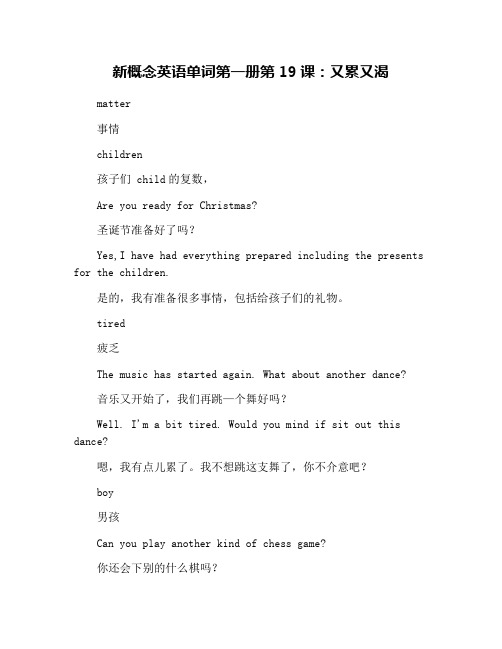
新概念英语单词第一册第19课:又累又渴matter事情children孩子们 child的复数,Are you ready for Christmas?圣诞节准备好了吗?Yes,I have had everything prepared including the presents for the children.是的,我有准备很多事情,包括给孩子们的礼物。
tired疲乏The music has started again. What about another dance?音乐又开始了,我们再跳—个舞好吗?Well. I'm a bit tired. Would you mind if sit out this dance?嗯,我有点儿累了。
我不想跳这支舞了,你不介意吧?boy男孩Can you play another kind of chess game?你还会下别的什么棋吗?Yes. When l was a little boy,1 was fond of Chinese draughts and army chess.会,当我还是个小男孩的时候,我很喜欢下跳棋和军棋。
thirstyI'm thirsty. Can you get me something to drink?我渴了,能给我拿点儿喝的吗?Sure. How about some mineral water?当然能够,来点儿矿泉水怎么样?mum妈妈sit down坐下I don't feel well.我觉得很难受。
You don't look well.Please sit down for a while.你看上去身体不太好,坐会吧。
right好;能够I know a person working for that company.我理解一个在那家公司工作的人。
That's just right,isn't it?那正好,不是吗?ice cream冰漠潜Would you like to order some dessert?你想点些甜点吗?I think I'II have a dish of vanilla ice cream.我想要盘香草冰淇淋好了。
新概念英语青少版1b课文Unit19:Youmusteat你必须吃

新概念英语青少版Unit 19 Lesson 37: You must eat 你必须吃DAISY: What time is it? ⼏点了?NINA: It’s four O’clock. 4点了。
DAISY: Four O’clock! Gee,I’m hungry! 4点了啊,天啦,我饿了。
NINA: I am.too! 我也饿了。
DAISY: OK.Thank you,Nina.We can finish now.There’s some food on the table over there.Let's eat.好了,谢谢你,妮娜,那边桌⼦上有⾷物,我们吃吧。
NINA: Daisy, I can look, but I can't eat. 黛茜,我能看,但我不能吃。
DAISY: Why not? You're tired. You're hungry. You can eat. What's the problem? 为什么不能?你累了,你饿了,你能吃,还有什么问题?NINA: Food is the problem. ⾷物就是问题。
DAISY: Come on,Nina! You must eat! There are lots of good things here.There’s some fish,and some salad. And there are some hot dishes,too.的了,妮娜,你必须得吃,那边有好多吃的东西,有鱼,有沙拉,还有热菜。
NINA: I can drink some water,but I mustn’t eat.I can’t eat and be beautiful.我可以喝点⽔,但是我不可以吃东西,吃了就不漂亮了。
DAISY: Nonsense,Nina! You are beautiful. 胡说,妮娜,你很漂亮。
新概念英语第一册第19课
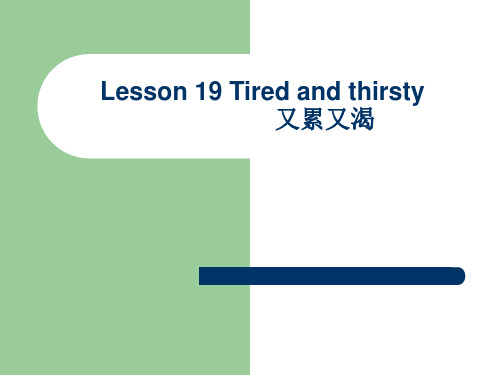
二、方位介词
on: 在...上面,接触物体表 面 over: 在……垂直上方,不接 触表面 in: 在...里面,物体里面 to : 往,向,表示去的方向
into: 进入..里面,从外到里进 入的过程 out of:在...外,从里面 出来 across:横穿(在物体 表面横穿),从平面穿 过
Lesson 19 Tired and thirsty 又累又渴
New words and expressions
matter ['mætə] n. 事情 children ['tʃɪldrən] n. 孩子们 tired [taɪəd] adj. 累,疲乏 boy [bɒɪ] n. 男孩 thirsty ['θɜːstɪ] adj. 渴 Mum [mʌm] n. 妈妈(口语) sit down ['sɪt-daʊn] 坐下 right [raɪt] adj. 好,可以 ice cream ['ais-'kri:m] 冰淇淋
They're fat.
They're thin.
They're big.
They're small.
40页练习
例. his shose/dirty/clean Are his shoes dirty or clean? They're not dirty.They're clean.
1.What’s the matter with the children? 2.Are they tired? 3.Are these ice creams nice? 4.Are they all right now?
新概念英语Lesson19-20(共35页)课件
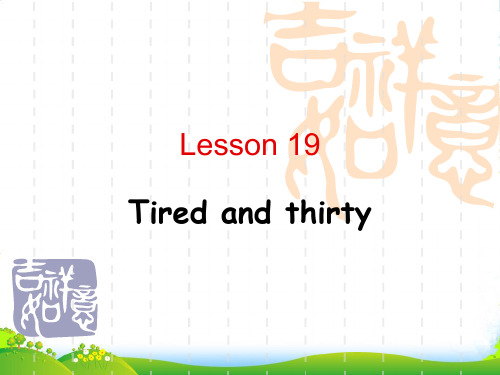
▪ ice 不可数名词 ▪ ice tea 冰茶 ▪ icy ['aisi] a. 冰凉的,冰爽的
▪ There be 句型 ▪ there be(is/are) 句型:表示某处有某物 ▪ there is + 可数名词的单数/不可数名词+介词短语
▪ There is a pen, two books and a knife on the desk.
wrong? = What’s wrong? ▪ What’s the matter with + sb. ▪ What’s wrong with + sb. ▪ What’s the matter with you today? ▪ 你今天怎么回事? ▪ What's the matter with the children / my
watch / your T-shirt?
▪ It doesn‘t matter. 没关系 ▪ ---- Sorry. ▪ ---- It doesn‘t matter. ▪ It matters. 有关系 ▪ Does it matter? 有关系吗?可以吗?
▪ children n. 孩子们 (child 的复数) ▪ ---- Whose child is this? ▪ ---- This is her child. ▪ ---- Whose is this child? ▪ ---- This child is hers. ▪ kid ▪ Tom is a lovely child. ▪ childhood 童年 ▪ -hood 后缀 通常表达一种状态,做儿童的状态 ▪ my childhood 我的童年 ▪ motherhood 做母亲的那种状态 → 为人母 fatherhood 为人父 ▪ neighborhood 街坊
新概念英语第一册课文1-143
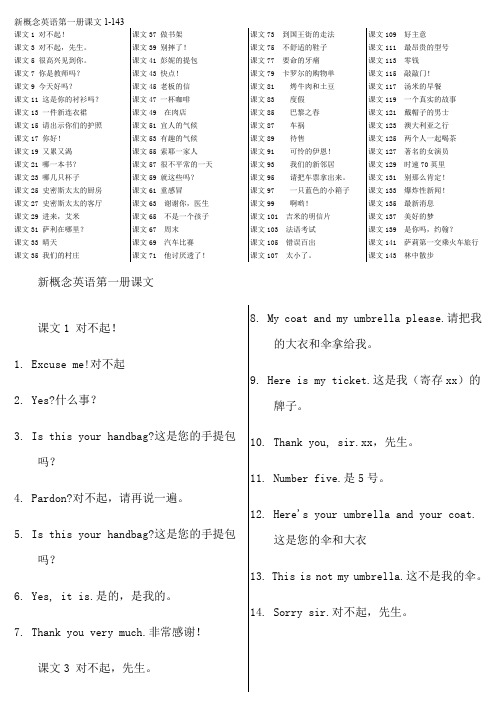
课文1 对不起!课文3 对不起,先生。
课文5 很高兴见到你。
课文7 你是教师吗?课文9 今天好吗?课文11 这是你的衬衫吗?课文13 一件新连衣裙课文15 请出示你们的护照课文17 你好!课文19 又累又渴课文21 哪一本书?课文23 哪几只杯子课文25 史密斯太太的厨房课文27 史密斯太太的客厅课文29 进来,艾米课文31 萨利在哪里?课文33 晴天课文35 我们的村庄课文37 做书架课文39 别摔了!课文41 彭妮的提包课文43 快点!课文45 老板的信课文47 一杯咖啡课文49 在肉店课文51 宜人的气候课文53 有趣的气候课文55 索耶一家人课文57 很不平常的一天课文59 就这些吗?课文61 重感冒课文63 谢谢你,医生课文65 不是一个孩子课文67 周末课文69 汽车比赛课文71 他讨厌透了!课文73 到国王街的走法课文75 不舒适的鞋子课文77 要命的牙痛课文79 卡罗尔的购物单课文81 烤牛肉和土豆课文83 度假课文85 巴黎之春课文87 车祸课文89 待售课文91 可怜的伊恩!课文93 我们的新邻居课文95 请把车票拿出来。
课文97 一只蓝色的小箱子课文99 啊哟!课文101 吉米的明信片课文103 法语考试课文105 错误百出课文107 太小了。
课文109 好主意课文111 最昂贵的型号课文113 零钱课文115 敲敲门!课文117 汤米的早餐课文119 一个真实的故事课文121 戴帽子的男士课文123 澳大利亚之行课文125 两个人一起喝茶课文127 著名的女演员课文129 时速70英里课文131 别那么肯定!课文133 爆炸性新闻!课文135 最新消息课文137 美好的梦课文139 是你吗,约翰?课文141 萨莉第一交乘火车旅行课文143 林中散步新概念英语第一册课文课文1 对不起!1. Excuse me!对不起2. Yes?什么事?3. Is this your handbag?这是您的手提包吗?4. Pardon?对不起,请再说一遍。
新概念英语第一册第19课
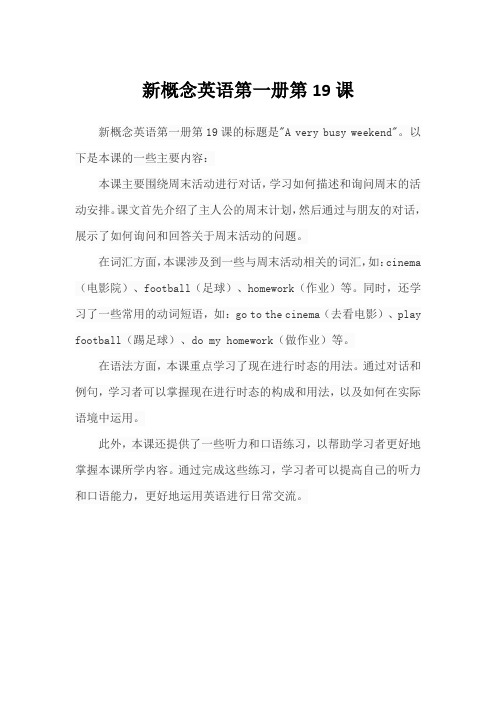
新概念英语第一册第19课
新概念英语第一册第19课的标题是"A very busy weekend"。
以下是本课的一些主要内容:
本课主要围绕周末活动进行对话,学习如何描述和询问周末的活动安排。
课文首先介绍了主人公的周末计划,然后通过与朋友的对话,展示了如何询问和回答关于周末活动的问题。
在词汇方面,本课涉及到一些与周末活动相关的词汇,如:cinema (电影院)、football(足球)、homework(作业)等。
同时,还学习了一些常用的动词短语,如:go to the cinema(去看电影)、play football(踢足球)、do my homework(做作业)等。
在语法方面,本课重点学习了现在进行时态的用法。
通过对话和例句,学习者可以掌握现在进行时态的构成和用法,以及如何在实际语境中运用。
此外,本课还提供了一些听力和口语练习,以帮助学习者更好地掌握本课所学内容。
通过完成这些练习,学习者可以提高自己的听力和口语能力,更好地运用英语进行日常交流。
新概念英语第一册课文翻译及学习笔记Lesson19
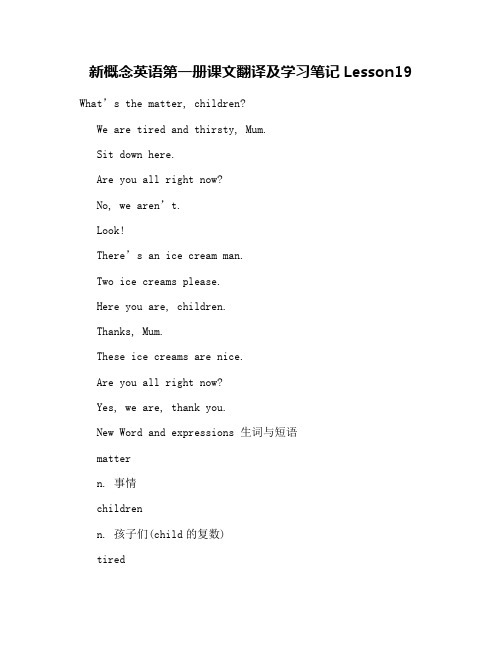
新概念英语第一册课文翻译及学习笔记Lesson19 What’s the matter, children?
We are tired and thirsty, Mum.
Sit down here.
Are you all right now?
No, we aren’t.
Look!
There’s an ice cream man.
Two ice creams please.
Here you are, children.
Thanks, Mum.
These ice creams are nice.
Are you all right now?
Yes, we are, thank you.
New Word and expressions 生词与短语
matter
n. 事情
children
n. 孩子们(child的复数)
tired
adj. 累,疲乏
boy
n. 男孩
thirsty
adj. 渴
Mum
n. 妈妈(儿语)
sit down
坐下
right
adj. 好,能够
ice cream
冰淇淋
本文参考译文
母亲:怎么啦,孩子们?
女孩:我们累了……
男孩:……口也渴,妈妈。
母亲:坐在这儿吧。
母亲:你们现在好些了吗?男孩:不,还没有。
母亲:瞧!有个卖冰淇淋的。
母亲:请拿两份冰淇淋。
母亲:拿着,孩子们。
孩子们:谢谢,妈妈。
女孩:这些冰淇淋真好吃。
母亲:你们现在好了吗?
孩子们:是的,现在好了,谢谢您!。
新概念英语第一册第19课

III. New words and expressions: clean 干净的 hot 热的
dirty 脏的
cold 冷的 thin 瘦的
fat
big
肥胖的
大的
small 小的 shut 关闭的 heavy 重的
open 打开的
light 轻的
old
老的;旧的 young 年轻的 new 新的
succeed, beat, buy, catch, invent, found, like,
observe, offer, prevent, promise, raise, find,
forget, receive, regard, see, say, seat, supply, select, suppose, show, make, take, tell
n. 事情 n. 孩子们 (child 的复数) adj. 累,疲乏 n. 男孩 adj. 渴 n. 妈妈 坐下 adj. 好,可以 冰淇淋
★matter n. 事情
① n. 事情,事件
It’s a private matter.
② n. 麻烦事,困难
What's the matter? =What’s wrong?
I really tire out. 我真的筋疲力尽了。 tireless adj. 1. 不倦的;不疲倦的;不厌倦的;孜孜不倦的 2. 坚韧的;持久的 tirelessly adv. 1. 不知疲倦地 2. 不屈不挠地; a tireless worker/teacher/student/mother
★thirsty adj. 渴
① adj. 渴的,口干的 ③ adj. 渴望的,渴求的
新概念英语第一册-第19-20课资料

Lesson 20 Look at them!
Lesson 20 Look at them!
• New word and expressions • 1 big [big] a.大的 • 2 small [smɔ:l] a.小的 • 3 open ['əupən] a.开着的 • 4 shut [ʃʌt] a.关着的 closed • 5 light [lait] a.轻的
Mother: What's the matter, children? Girl: We're tired … Boy: … and thirsty, Mum.
Mother: Sit down here. Mother: Are you all right now?
Boy: No, we aren't. Mother: Look! There’s an ice cream man.
sit down [´sɪt-daʊn] 坐下
right [raɪt]
adj.好,可以
ice cream [´aɪs- ´kri:m] 冰淇淋
matter
children
thirsty
sit down
ice cream
right tired
Listen!
1、What's the matter with children? 2、What does their mother buy? 3、Why do the children thank mother?
Here you are.给你
Girl: These ice creams are nice.
•these 这些 those 那些
•this 这个
新概念英语第一册-第19课-课件(共31张PPT)
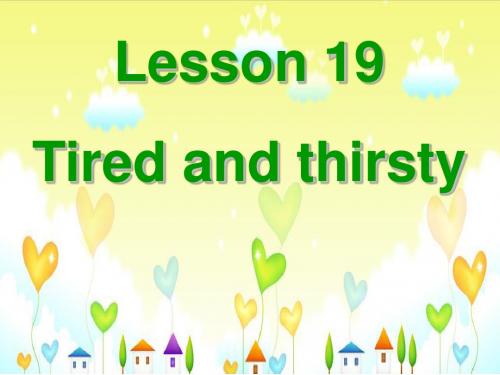
Mother: What’s them_at_te_r_ , children? Girl: We’reti_re_d__. Boy:… and t_h_ir_s_ty, Mum. Mother: Sit down here. Mother: Are you _a_l_l _r_ig_h_t now? Boy: No, we aren’t. Mother: Look! There’s anice__c_re_a_m__ man. Mother: Two ice creams please. Mother:H_e_re_ _y_o_u_ _a_r_e_, children. Children: Thanks, Mum. Girl: These ice creams are _n_ic_e_. Mother: Are you _a_ll_ _ri_g_h_t now? Children: Yes, we are, thank you!
man.Two ice creams please. Here you are, children. Children: Thanks, Mum. Girl: These ice creams are nice. Mother: Are you all right now? Children: Yes, we are, thank you.
Lesson 19 Tirter?
tired
thirsty
New words and expressions
matter
n. 事情
children
n. 孩子们
(child 的复数)
tired
adj. 累的,疲乏的
boy
n. 男孩
thirsty
二.连词成句 1. matter, is, the, what
新概念英语一册19-20课习题

新概念英语一册19-20课习题Lesson19---Lesson20Tired and XXX又累又渴一、填空。
1.没关系____________2.请坐______________________3.口渴的_______________4.冰淇淋______________5.好的,可以_________________6.轻的/淡的________________7.重的_________________8.一双鞋子__________________9.闭嘴_________________10.开着的_______________二、从下面A、B、C三个选项中选出正确的答案,并把正确的字母编号写在括号里。
() 1.—___ with you, Lucy?—I am XXX.A.XXX. What are you doing() 2.—How are you, Jill?—____A. Fine, thank youB. Yes, I am fineC. How are you?() 3. I am tired of ___ this kind of things.XXX do() 4. When the traffic light is ___, we must stop.A. XXX() 5. This is ___ XXX.A. aB. anC. the() 6. Everybody likes her. She always speaks in a ___ way.A. XXX() 7. Mum, I am hungry. Would you please pass ___ some bread.A. XXX() 8.It‘smy ___. Give it to me, please.A. XXX() 9.—___ does the farmer have, do you know?—Idon‘tknow.Let‘sgo and ask him.A. XXX() 10. We always have ___ rice for ___ lunch.A. /;/B. the;/C. /;a() 11. There ___ picture on ___ wall, I like ___ picture very much.A. a/the/theB. a/the/aC a/the/a() 12.It‘XXX ___ school.A. XXX() 13.—Whose book is this? Is this yours?—No,it‘s___A. XXX() 14.—Would you like some tea?—Yes, ___A. thank youB. here you areC. show me() 15. I am a student. ___ name is Tom.A. XXX3、浏览漫笔。
【英语】新概念英语第一册课文及翻译

【关键字】英语新概念英语第一册Lesson1: Excuse me!Excuse me!Yes?Is this your handbag?Pardon?Is this your handbag?Yes, it is.Thank you very much.对不起什么事?这是您的手提包吗?对不起,请再说一遍。
这是您的手提包吗?是的,是我的。
非常感谢!Lesson 3:Sorry sir.My coat and my umbrella please. Here is my ticket.Thank you sir.Number five.Here is your umbrella and your coat. This is not my umbrella.Sorry sir.Is this your umbrella?No, it isn't.Is this it?Yes, it is.Thank you very much.请把我的大衣和伞拿给我。
这是我(寄存东西)的牌子。
谢谢,先生。
是5号。
这是您的伞和大衣这不是我的伞。
对不起,先生。
这把伞是您的吗?不,不是!这把是吗?是,是这把非常感谢。
Lesson 5: Nice to meet you. Good morning.Good morning, Mr. Blake.This is Miss Sophie Dupont. Sophie is a new student.She is a French.Sophie, this is Hans.He is German.Nice to meet you.And this is Naoko.She’s Japanese.Nice to meet you.And this is Chang-woo.He’s Korean.Nice to meet you.And this is Luming.He’s Chinese.Nice to meet you.And this is Xiaohui.She’s Chinese, too.Nice to meet you.布莱克先生:早上好。
新概念英语第一册19,20,21课

among the crowds
small
• 指体积小 little 含小而 可爱之意
• small eyes a small room
• a little boy my little brother
③ adj. 正确的 反义词:wrong [rɔŋ] He gets the right answer
There be句型 用来表示某地存在某物
• 句型的结构:
– 1)There is + 可数名词单数/不可数名词 + 介词短语. – 2)There are + 可数名词复数 + 介词短语.
– 介词短语= 介词 + 名词 – 介词包括:in (在…里面), on (在…上面)…
• pencil sharpener
• 3)n.夏普 • Brother Sharp 犀利哥
-en后缀或en-前缀
• 前缀en-和后缀-en尽管词缀形式相同,但两者的构词功能 迥然不同,前者仅用作动词词缀,而后者可作动词、形容 词及名词词缀.
• 后缀-en的构词功能 • 接在某些形容词后面构成动词,有“做”、“使”、“成
tired
• ①adj.困乏的 • Jack always has lots of work to do and he feels
tired. • ②adj. 厌烦的 be tired of sth /doing sth • If you are tired of driving, let me know please. • The poor student is tired of his study. • tired out =completely tired 筋疲力尽 • tireless adj. [’taɪəlɪs] 1. 不倦的;不疲倦的;不厌倦的;
Lesson19新概念英语第一册

生词和短语
thirsty ['θə:sti] a. 渴 mum ['mʌm] n. 妈妈(儿语) sit down [ˌsit'daun] 坐下 right [rait] a. 好,可以 ice cream [ˌais'kri:m] 冰淇淋
生词和短语
big [big] a.大的 small [smɔ:l] a.小的 open ['əupən] a.开着的 shut [ʃʌt] a.关着的
语法知识点
PART FOUR
语法知识点
1. 了解there be的含义 There is an ice cream man. 有个卖冰激凌的人。
There is a book on the desk. 桌上有本书。
There are sБайду номын сангаасme boys in the room. __________________
sh-/ʃ/ shoe/shake/she/share/shirt
Thank you!
light [lait] a.轻的 heavy ['hevi] a.重的 long [lɔŋ] a.长的 shoe [ʃu:] n.鞋子
生词和短语
生词和短语
grandfather ['grændˌfɑ:ðə] n.祖父,外祖父 grandmother ['grænˌmʌðə] n.祖母,外祖母
02
There’s some water in the cup. __________________
语法知识点 2. 可数名词变复数的不规则变化 ☆ 羊鹿鱼单复同形 sheep/deer/fish
语法知识点
2. 可数名词变复数的不规则变化
新概念英语第一册第19课教学设计
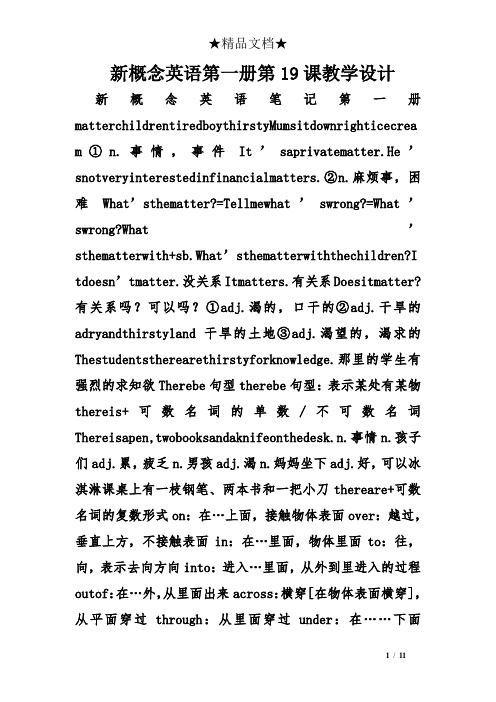
新概念英语第一册第19课教学设计新概念英语笔记第一册matterchildrentiredboythirstyMumsitdownrighticecrea m①n.事情,事件It’saprivatematter.He’snotveryinterestedinfinancialmatters.②n.麻烦事,困难What’sthematter?=Tellmewhat’swrong?=What’swrong?What’sthematterwith+sb.What’sthematterwiththechildren?I tdoesn’tmatter.没关系Itmatters.有关系Doesitmatter?有关系吗?可以吗?①adj.渴的,口干的②adj.干旱的adryandthirstyland干旱的土地③adj.渴望的,渴求的Thestudentstherearethirstyforknowledge.那里的学生有强烈的求知欲Therebe句型therebe句型:表示某处有某物thereis+可数名词的单数/不可数名词Thereisapen,twobooksandaknifeonthedesk.n.事情n.孩子们adj.累,疲乏n.男孩adj.渴n.妈妈坐下adj.好,可以冰淇淋课桌上有一枝钢笔、两本书和一把小刀thereare+可数名词的复数形式on:在…上面,接触物体表面over:越过,垂直上方,不接触表面in:在…里面,物体里面to:往,向,表示去向方向into:进入…里面,从外到里进入的过程outof:在…外,从里面出来across:横穿[在物体表面横穿],从平面穿过through:从里面穿过under:在……下面deside:在……旁边near:在……附近between:在……两者之间among在…中间over:从斜面穿过介词用法:1、跟在be动词之后2、跟在一些不及物动词之后课型:Newlesson 教学内容与目的要求:1、LearnLesson53Aninterestingclimate2、LearnSimplePresent.3、LearntheexerciseofPassage8inPETS(1B).4、ReviewthePhoneticSymbols.(3)重点句型及重点单词、词语:Phrases:intheEast/West/South/North表示一个国家的东/南/西/北部intheeast/west/south/north表示方向太阳升起用rise,太阳降落用set.Structure:Wheredoyoucomefrom?Icomefrom.Whichdoy oulikebest?一般现在时中主语为第三人称单数时的动词加S教学准备:①Recorder②tape③phonogramcards④wordcards⑤stars⑥poster⑦phoneticsymbolcards⑧teachingplan⑨教学流程表⑩Pictures教学程序及教学游戏安排:Step Ⅰ:Warmingupexercise1.Gealgreeting1>Howistheweathe r?2>Whocooksbreakfastforyou?3>Whichanimalsdoyoulike more,bearsorpandas?4>WhatdoyouusuallydoonSundaymorn ings?5>InwhichmonthisourNationalDay?ReviewthePhonog rams,thePhoneticSymbolsandthewords.flashcardsPasscardsStepⅢLearnLesson251.Learnnewwordsmildalwaysseasoneastwe stsouthnorthrisesetinterestingsubjectconversationcl imatecertainlypleasantfavourite(根据福尼斯英语的单词教学步骤进行课文中新单词的教学)①Tsoundsthewords3times.②TmakessentenceswiththewordsandSsguessthemeaning.③Sswritethewordsintheirnotebooks.④Tchecksthewords.⑤Ssreadthewordstogether.⑥Sslistentothewordstapeandtranslatethesentenceswitht henewwords.(训练学生的听力及理解能力)⑦Game:Directiongames2.Learnthetext.①Introducethestory.T:Todaywe’regoingtotalkabouttheweatherinEngland.②Understandthesituation.AskSstointerpretthepicture.③Listentotheobject.T:Listentothestoryandseeifyoucana nswerthisquestion:WhereistheJonesfamily?④Intensivereadingandunderstandthetext.Playthetapeorr eadthedialogueagain,pausingaftereverylinetocheckthe studentsunderstand.Phrases:intheEast/West/South/Nor th表示一个国家的东/南/西/北部intheeast/west/south/north表示方向太阳升起用rise,太阳降落用set.Structure:Wheredoyoucomefrom?Icomefrom.Whichdoy oulikebest?Game:击鼓传花:传到的小朋友选一纸条,纸上有国家名称和主语,请小朋友马上组成对话:Wherecomefrom?come(s)from⑤Askquestions.⑥Dotranslations.(EnglishtoChineseandChinesetoEnglish .)⑦SsaskTquestions.Reviewthequestionwords:whywhatwhere whichwhohowTaskSstoaskTquestionsaccordingtothetext.⑧LittleJournalist.(themorethebetter.)StepⅢGrammar1LearnSimplePresent.1>引出一般现在时基本用法:一般现在时表示经常发生的事情或者经常存在的状态动词表示动作和状态的词基本结构:Heisoneofmydearestfriends.(2)他的女儿是他心爱的宝贝Hisdaughterisverydeartoher.2.(Dear)usedatthebeginni ngofaletterbeforethenameortitleofthepersonthatyouar ewritingto(用于信函抬头的名字或头衔前)亲爱的3.[notusuallybeforenoun](BrE)expensive;costingaloto fmoney昂贵,价格高现在什么东西都那么贵edwhenspeakingtosb.youl ove(常作称呼所爱的人)亲爱的喝点什么吗,亲爱的?Wouldyoulikeadrink,dear?adv.(atahighprice)高价地,昂贵地(1)他的错误使他付出很高的代价Hiserrorscosthimdear.(2)贱买贵卖tobuycheapandselldearexclamation[,ekskl?’mei??n]us edinexpressionsthatshowthatyouaresurprised,upset,an noyedorworried(惊奇,不安,烦恼,担忧等时说)啊,哎呀,糟糕,天哪哎呀!我忘了寄信Ohdear!Iforgottoposttheletter.2.kidnapper[‘k?dn?p? ]n.绑票者;劫持者劫持者索要100万元赎金Thekidnappersaredemandingaransomof$1million.kidnap[‘kidn?p]v.(-pp-)[vn]totakesbawayillegallyandkeepth emasaprisoner,especiallyinordertogetmoneyorsthelsef orreturningthem劫持;绑架两名商人遭恐怖分子绑架Twobusinessmenhavebeenkidnappedbyterrorists.kidnapp ing(alsokidnap)n.[u,c]绑架(1)他对绑架的指控供认不讳Headmittedthechargeofkidnap.(2)对12名美国公民的劫持thekidnappingof12UScitizens[k?n’sid?r?bl]adj.(form al)greatinamount,size,importance,etc.相当多(或大、重要等)的e.Theprojectwastedaconsiderableamountoftimeandmoney .(2)对这栋建筑物的损坏相当严重Damagetothebuildingwasconsiderable.considerablyadv.(formal)much;alot非常;很;相当多地不同的人对睡眠的需要差异相当大Theneedforsleepvariesconsiderablyfrompersontoperson .[‘welθi]adj.(wealthier,wealthiest)1.rich;havealotofmoney, possessions,etc.富有的,有钱的,财产多的有钱人家awealthyfamily2.n.[pl.]peoplewhoarerich富人,有钱人;阔人n.wealth5.在英语中,当名词有多个形容词修饰时,就有它们的先后顺序下面的口诀可帮你记住这一先后顺序限定描绘大长高,形状年龄和新老;颜色国籍跟材料,作用类别往后靠;“限定词”包括:冠词、物主代词、指示代词、或数词,它位于各类形容词前它本身分为三位,即:前、中、后前位限定词有all、half、both、such分数和倍数;中位限定词有冠词、指示代词、形容词性物主代词、名词所有格和no、every、each、either、neither、enough、much、以及wh-起首的限定词[what(ever),which(ever),whose]等;后位限定词有基数词和序数词、past、same、many、more、most、few、fewer、fewest、little、less、least、own、last等,但序数词位于基数词前如:bothmyhands、allhalfhisincome等“描绘”类形容词表示事物的性质及人们的观点如:beautiful、bad、cold、great等“大长高”表示大小、长短、高低等一些词表示“形状”的词如:roundsquare等“国籍”指一个国家或地区的词“材料”的词如:wooden,woolen,stone,silk等“作用类别”的词如:medical,college,writingdesk,policecar等具体应为限定词+描绘类+形状类+时间类+颜色类+出处类+材料类+用途类+作定语的名词、动名词v.1.(~sthwithsb.)tohaveorusesth.atthesametimeassb.e lse.共有,合用苏和另外三个学生合住一所房子Suesharesahousewiththreeotherstudents.2.(~sthwithsb .)togivesomeofwhatyouhavetosb.else;esth.t hatisyours分享;共享(1)汤姆把他的巧克力和其他孩子一起分着吃了Tomsharedhischocolatewiththeotherkids.(2)研讨会是互通信息、交流思想的好场所Theconferenceisagoodplacetoshareinformationandexcha ngeideas.3.~(in)sth./~sth.(withsb.)tobeequallyinvol vedinsth.orresponsibleforsth.共同承担,分担(1)我努力让孩子们分担家务活Itrytogetthekidstoshareinthehousework.(2)事故责任由两个驾车人共同承担Bothdriverssharedtheblamefortheaccident.n.1.[c]~(of /insth.)onepartofsth.thatisdividedbetweentwoormorep eople(在若干人之间分得的)一份明年我们希望获得更大的市场份额Nextyearwehopetohaveabiggershareofthemarket.2.[c]~( insth.)anyoftheunitsofequalvalueintowhichacompanyis dividedandsoldtoraisemoney.Peoplewhoownsharesreceiv epartofthecompany’sprofits.股份;股票(1)英国电信公司的股份sharesinBritishtelecom(2)股票价格的跌落/上涨afall/increaseinshareprices7.flat[fl?t]n.[c](BrE)as etofroomsforlivingin,includingakitchen,usuallyonone floorofabuilding一套房间;公寓;单元房他们租了三楼的一层带家具的公寓Theyarerentingafurnishedflatonthethirdfloor.adj.(fl atter,flattest)1.havingalevelsurface,notcurvedorslo ping水平的,平坦的人们曾经认为地球是平的Peopleusedtothinktheearthwasflat.2.notshowingmuchem otion;notchangingmuchintone平淡的;单调的;无聊的令人兴奋的事过后,她感到平淡无味Aftertheexcitementwasover,shefeltflat.3.[onlybefore noun]notallowingdiscussionorargument;definite断然的;绝对的他断然拒绝了我Hegavemeaflatrefusal.adj.1.arrangedororganizedinane at,carefulandlogicalway整洁的;有秩序的;有条理的(1)平静有序的生活acalmandorderlylife(2)一行行栽种整齐的蔬菜vegetablesplantedinorderlyrows(3)头脑清晰的女人awomanwithanorderlymind(4)他条理分明地回答了老师的提问Hegaveanorderlyanswertotheteacher’squestion.2.beha vingwell;peaceful表现良好的;守秩序的秩序井然的示威anorderlydemonstrationopposite:disorderlyn.[C](pl.-ies)1.apersonwhoworksinahospital;usuallydoingjobsth atdonotneedanyspecialtraining(医院的)护理员soldierwhodoesjobsthatdonotneedanyspecialtraining勤务兵9.anonymous[?’n?nim?s]adj.1.(ofaperson)withanameth atisnotknownorthatisnotmadepublic不知姓名的;名字不公开的这笔款项是当地一位不愿透露姓名的企业家捐赠的Themoneywasdonatedbyalocalbusinessmanwhowishestorem ainanonymous.2.written,given,made,etc.bysb.whodoesn otwanttheirnametobeknownormadepublic匿名的;不具名的我们收到一封匿名信Wereceivedananonymousletter.3.(written)withoutanyun usualorinterestingfeatures没有特色的单调的建筑theanonymousbuildingsadv.anonymouslyn.anonymity[,?n ’nimiti]n.[u]thestateofremainingunknowntomostothe rpeople匿名;不知姓名;名字不公开他同意在不披露姓名的条件下接受采访Heagreedtogiveaninterviewonconditionofanonymity.ins afehandsbeinsafehands在可靠人手中此处hands用来指人常见的此类短语有badgood能人ingreen在生手中new新old在使用中,应注意与介词短语inhand的区别inhand在句中可作状语、定语、补足语,主要用来表达以下几种含义:1.在手头;可供使用2.在掌握中;在控制中3.正在处理中;在进行中,如:(1)由于手中的问题紧迫,我们马上就把它解决了Asthematterinhandwasurgent,wedealtwithitatonce.(2)你能完全控制住这种形势吗?Canyouhavethesituationwellinhand?(3)开始新的工作之前,我们应完成我们正在进行的工作Weshouldfinishtheworkwehaveinhandbeforewebeginsomet hingnew.inthehandsofsb./insb.’shandsbeinglookedafterorcontrolledbysb.受某人照料;被某人控制这件事现在正由我的律师处理Thematterisnowinthehandsofmylawyer.11.ransom[‘r?ns m]n.[c;u]moneythatispaidtosb.sothattheywillsetfree apersonwhoisbeingkeptasaprisonerbythem赎金绑架者向他的家人索要赎金5万英镑Thekidnappersdemandedaransomof£50,000fromhisfamily.v.[vn]topaymoneytosb.sothatth★精品文档★eywillsetfreethepersonthattheyarekeepingasaprisoner (为某人)交付赎金他们用一万元赎回了被绑架的孩子Theyransomedthekidnappedchildwith10,000dollars.12.i nstruct??todo??instruct??todo??在此结构中,动词不定式在句中作宾语补足语大夫嘱咐那个病人上床休息Thedoctorinstructedthepatienttogotobedandrest.但当用于被动语态时,由于宾语提前作了主语,动词不定式则成为主语的补足语,如:他奉命把她带到纽约He’sbeeninstructedtotakehertoNewYork.13.cardboardn.[u] stiffmateriallikeverythickpaper,oftenusedformakingb oxes硬纸板,卡纸板(常用于制造盒子)这箱子是硬板纸制的Theboxismadeofcardboard.adj.[onlybeforenoun]notseem ingrealorgenuine不真实的;虚假的这个故事里有好几个虚构的人物Thestoryhasseveralcardboardcharacters.11/ 11。
新概念英语第十九课基础知识
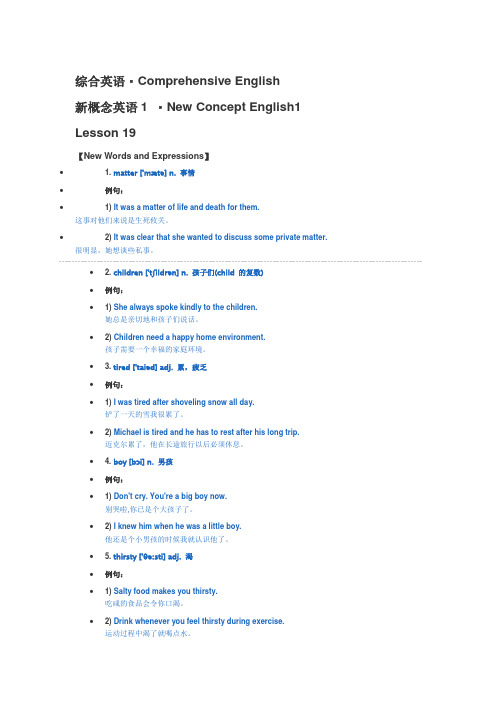
综合英语・Comprehensive English新概念英语1 ・New Concept English1Lesson 19【New Words and Expressions】∙ 1. matter ['mætə] n. 事情∙例句:∙1)It was a matter of life and death for them.这事对他们来说是生死攸关。
∙2)It was clear that she wanted to discuss some private matter.很明显,她想谈些私事。
∙ 2. children ['tʃildrən] n. 孩子们(child 的复数)∙例句:∙1)She always spoke kindly to the children.她总是亲切地和孩子们说话。
∙2)Children need a happy home environment.孩子需要一个幸福的家庭环境。
∙ 3. tired ['taiəd] adj. 累,疲乏∙例句:∙1)I was tired after shoveling snow all day.铲了一天的雪我很累了。
∙2)Michael is tired and he has to rest after his long trip.迈克尔累了,他在长途旅行以后必须休息。
∙ 4. boy [bɔi] n. 男孩∙例句:∙1)Don't cry. You're a big boy now.别哭啦,你已是个大孩子了。
∙2)I knew him when he was a little boy.他还是个小男孩的时候我就认识他了。
∙ 5. thirsty ['θə:sti] adj. 渴∙例句:∙1)Salty food makes you thirsty.吃咸的食品会令你口渴。
∙2)Drink whenever you feel thirsty during exercise.运动过程中渴了就喝点水。
新概念英语第一册Lesson19
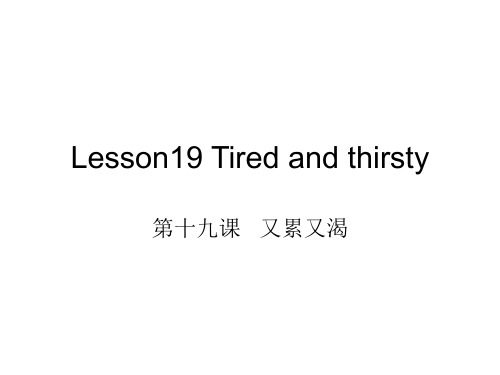
• words and expressions
Let’s learn more
• • • • • • What’s the matter? 怎么了? What’s the matter=what’s wrong? What’s the matter with sb.某人/某某怎么了 Cliff怎么了? 你的父母怎么了? 你的小猫怎么了?
• • • • • • • •
It doesn’t matter.没关系。用于回答“sorry” I’m sorry I’m late. it doesn’t matter. Tire out 筋疲力尽 Tireless 不知疲倦的 Ment是名词后缀,如employment development Un是前缀,表示相反的,如unhappy,unemply Less是形容词后缀,具有否定意义,如tireless, hopeless, joyless,
review
• • • • • • • • • • • • • • 一、用适当的人称代词填空: 1. __________ is my aunt. We often visit __________. 2. China is a developing country. __________ lies in the east of Asia. 3. Professor Wang sets __________ a good example. We must learn from __________. Between you and ________, he is not a real friend. A. me B. I C. he D. his 4. My uncle bought a new bike for ________. A. theirs B. they C. me D. I 6. Here’s a postcard for you, Jim! ? Oh, ________ is from my friend, Mary. A. he B. it C. she D. it’s 8. Little Baby knows that he should not take the things that do not belong to ________. A. he B. his C. her D. him 9. Will anyone go on a trip with him ? Not ________. A. I B. me C. mine D. he
Lesson19-20笔记(素材)新概念英语第一册

新概念英语第一册Lesson 19-20讲解单词讲解:1.matter n. 事情,事件,麻烦事,困难;V. 有关系,要紧This matter is important to me. 这件事对我很重要。
What's the matter, Anna ?怎么了,安娜?It doesn't matter. 没关系。
2. children n.孩子们(复数)child n. 孩子(单数)kid-kidsChildren love to play in the park. 孩子们喜欢在公园里玩。
3. tired adj. 累的,疲乏的dog-tired 极度疲乏的(累成狗)I am tired. 我很累。
Is he tired? 他很累吗?4.boy n. 男孩The boy loves to play with his toys. 男孩喜欢玩他的玩具。
I am thirsty. 我口渴了。
hungry adj. 饿的6.mum 妈妈dad爸爸7.sit down 坐下stand up 起立8. right1).好的,可以all right=ok-Let's play football.-All right.2). 正确的You are right. 你是对的。
反义词:wrong 错误的3). 右边的on the right 在右边反义词:left 左边的on the left在左边9. ice cream 冰淇淋ice 冰cream奶油;乳酪;面霜10.big 大的,反义词small 小的风大,雨大,雪大用heavy声音大用loud年纪大用old面积大用large11.open1). adj. 开着的反义词:shut 关着的The door is open. 门是开着的。
Please open the door. 请开一下门。
12.shut1). 关着的,停止营业的,相当于closedThe window is shut. 门是关着的。
新概念英语第一册第19-20课-Tired-and-thirsty
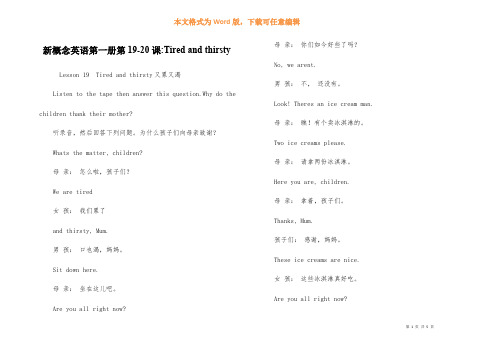
新概念英语第一册第19-20课:Tired and thirsty Lesson 19 Tired and thirsty又累又渴Listen to the tape then answer this question.Why do the children thank their mother?听录音,然后回答下列问题。
为什么孩子们向母亲致谢?Whats the matter, children?母亲:怎么啦,孩子们?We are tired女孩:我们累了and thirsty, Mum.男孩:口也渴,妈妈。
Sit down here.母亲:坐在这儿吧。
Are you all right now? 母亲:你们如今好些了吗?No, we arent.男孩:不,还没有。
Look! Theres an ice cream man. 母亲:瞧!有个卖冰淇淋的。
Two ice creams please.母亲:请拿两份冰淇淋。
Here you are, children.母亲:拿着,孩子们。
Thanks, Mum.孩子们:感谢,妈妈。
These ice creams are nice.女孩:这些冰淇淋真好吃。
Are you all right now?母亲:你们如今好了吗?Yes, we are, thank you.孩子们:是的,如今好了,感谢您!New Word and expressions 生词和短语mattern. 事情childrenn. 孩子们〔child的复数〕tiredadj. 累,疲乏boyn. 男孩thirstyadj. 渴Mumn. 妈妈〔儿语〕sit down坐下rightadj. 好,可以ice cream冰淇淋Notes on the text课文解释1 Whats the matter?=Tell me whats wrong.怎么啦?2 Theres=There is.Lesson 20 look at them!看看他/它们!New words and expressions生词和短语big adj. 大的small adj.小的open adj.开着的shut adj.关着的light adj.轻的heavy adj.重的long adj.长的shoen.鞋子grandfathern.祖父,外祖父grandmothern.祖母,外祖母Lesson 19-20 自学导读First things first课文详注 Further notes on the text1.Whats the matter?怎么啦?相当于 Whats wrong?或 Tell me whats wrong。
- 1、下载文档前请自行甄别文档内容的完整性,平台不提供额外的编辑、内容补充、找答案等附加服务。
- 2、"仅部分预览"的文档,不可在线预览部分如存在完整性等问题,可反馈申请退款(可完整预览的文档不适用该条件!)。
- 3、如文档侵犯您的权益,请联系客服反馈,我们会尽快为您处理(人工客服工作时间:9:00-18:30)。
bag
---------
dress
---------
license
---------
story
---------
toy
---------
zoo
---------
hero
---------
IV. Write in the plurals of these nouns :
hero
---------
belief
There be 句型(there是个引导词,本身没有词意) there be 句型:表示某处有某物 there is + 可数名词的单数/不可数名词 There is a pen, two books and a knife on the desk. 课桌上有一枝钢笔、两本书和一把小刀。(第一个并
的
★thirsty adj. 渴
① adj. 渴的,口干的 We are tired and thirsty. Are you thirsty? ② adj. (工地等)干旱的 a dry and thirsty land 干旱的土地 dry---wet ③ adj. 渴望的,渴求的(for / after) The students there are thirsty for
n. 妈妈
sit down 坐下
right
adj. 好,可以
ice cream 冰淇淋(有时可数,有时不可数)
★matter n. 事情
① n. 事情,事件 It’s a private matter. ② n. 麻烦事,困难 What's the matter? =Tell me what’s wrong? =What’s
表示总称的概念 (不可数) clothing food furniture fruit luggage
表示该总称概念下的具体事物 (常可数) sweaters pants dresses Vegetables meat spaghetti Chairs tables beds Apples oranges bananas Bags suitcases
II. Translate the following into Chinese:
母 亲: 怎么啦,孩子们? 女 孩: 我们累了…… 男 孩: ……口也渴,妈妈。 母 亲: 坐在这儿吧。
你们现在好些了吗? 男 孩: 不, 还没有。 母 亲: 瞧!有个卖冰淇淋的。
请拿两份冰淇淋。 拿着,孩子们。 孩子们: 谢谢,妈妈。 女 孩: 这些冰淇淋真好吃。 母 亲: 你们现在好了吗? 孩子们: 是的,现在好了,谢谢您!
III. New words and expressions:
clean 干净的 dirty 脏的
hot 热的
cold 冷的
fat 肥胖的 thin 瘦的
big 大的
small 小的
open 打开的 shut 关闭的
light 轻的
heavy 重的
old 老的;旧的 young 年轻的 new 新的
right adj. 对的, 正确的, 准确的
right--- (反) wrong ---Am I right? ---No, you are wrong. right n.权利 human rights
★ ice cream 冰激凌 two ice creams
Grammar [语法]
定和否定回答。 (some和any都表示一些,但some用在肯定
句中,any用在否定句和疑问句中。)
“大”在英语中的具体对应表达
雨量大、雪大、雾气大 风大,地震大 声音大 年岁大 形体,势力巨大 伟大的 幅员辽阔的 块头大的,胖大的
heavy strong loud old huge great large big
knowledge. 那里的学生有强烈的求知欲。
★ Mum 妈妈(儿语) ★ Dad 爸爸(儿语)
Sit down 坐下。 Take your seat.
Stand up.起立。
★ right adj. 好,可以
1) adj. 好,可以
---Let’s go upstairs and see my new skirt.
short 矮的;短的 tall 高的 long 长的
Match them: clean hot fat big open light old short
cold thin small dirty shut young new heavy tall long
IV. Write in the plurals of these nouns :
Question:
Why do the children thank their mother
I. Fill in the blanks(填空):
What’s the matter ,children ?
We’re thirty , Mum . We’re Tired …
Sit down , here . Are you all right ,now ?
No ,We are not .
Look ! There’s an ice cream man .
Two ice creams,please . Here you are ,children . Thanks, Mum .
These ice creams are very nice .
Are you all right now ? Yes , we are ,thank you !
★ tired adj. 累,疲乏
eg. I’m tired. 我累了。 tire out: completely tired 精疲力竭
tireless adj. [’taɪəlɪs] 1. 不倦的;不疲倦的;不厌倦的;孜孜不倦的 2. 坚韧的;持久的
tirelessly adv. 1. 不知疲倦地2. 不屈不挠地;坚忍地 a tireless worker/teacher/student/mother
[ŋ] thing bang sung
Lesson 19 Tired and thirty
Vocabulary [词汇]
matter n. 事情
children n. 孩子们 (child 的复数)
tired
adj. 累,疲乏
boy
n. 男孩
ห้องสมุดไป่ตู้
thirsty adj. 渴
Mum
meter
---------
deer
---------
quiz
---------
mouse
---------
zero
---------
名词的数:可数与不可数
常作不可数的名词 第一组:对于一些无法分割的名词,我们将其看作一个
整体,因而作为不可数名词,没有复数变化。 气体:air fog oxygen smoke等 液体:beer blood coffee cream gasoline honey Juice milk oil tea water wine等 固体:bread butter cheese ice ice cream meat beef
列名词是单数,所以用is) there are + 可数名词的复数形式
常见方位介词:in、on、over、under
on:在…上面,接触物体表面on the table/desk/floor/wall
over:越过,垂直上方,不接触表面 in:在…里面,物体里面 in the box/office/bag to:往,向,表示去向方向 into:进入…里面,从外到里进入的过程 out of:在…外,从里面出来 across:横穿[在物体表面横穿],从平面穿过
through:从里面(中间)穿过 under:在……下面 beside:在……旁边 near:在……附近 between:在……两者之间 among 在…中间(两者以上) over:从表面穿过
介词用法:
(1)跟在be动词之后
(2)跟在一些不及物动词之后
★通常所说be既包括系动词be也包括助动词be 系动词后接名词、形容词、介词短语、(少数)副词及非谓语动 词或从句作表语。(记住名、形、介、副就行了) I‘m a student. /I’m tall. /I‘m in Class One. 助动词是用来构成否定句疑问句或时态的,不能独立做谓语,只 能和后面的实义动词一起使用。(有完整词汇意义的动词叫做实
chicken fish copper cotton glass gold iron paper
第二组:一些因其组成部分太小而不易数 的名词
Corn
popcorn
sand
Grass
rice
snow
hair
salt
sugar
第三组:表示总称的名词通常不可数。这
些名词侧重于表示某类事物总的概念,而 不是具体的事物
---------
thief
---------
milkman
---------
yuan
---------
pound
---------
chess
---------
IV. Write in the plurals of these nouns :
sheep
---------
people
---------
★children n. 孩子们 (child 的复数)
---Whose child is this? ---This is her child.
---Whose is this child? ---This child is hers.
